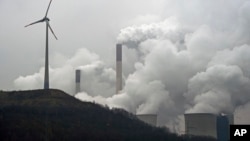Coal-fired power stations are responsible for the most pollution in Europe, with Britain among the top polluters, the European Union says.
The European Environment Agency said in a report late Sunday that half of the plants responsible for the largest releases of air and water pollution were in Britain, with a total of 14. Germany was second with seven, followed by France and Poland, each with five.
The agency reviewed emissions data from 35,000 industrial plants in 2015 — the latest available data — including power stations, petrochemical refineries and metal processing units from the 28 members of the European Union, and Iceland, Liechtenstein, Norway, Switzerland and Serbia.
It said that "good progress is being made by the EU toward its climate and energy policy objectives for 2020 and 2030." However, it noted that coal remains the most used fuel in large combustion plants — power plants, refineries, large chemical plants and steelworks — despite a decreasing amount being used over recent years, and a threefold increase in biomass use between 2004 and 2015.
Coal is still responsible for the largest releases of carbon dioxide, sulfur dioxide and nitrogen oxides into the environment, although some plants have significantly improved their environmental performance over recent years, releasing fewer emissions into the environment.
The worst in 2015 were the Belchatow power plant in Poland, which released the highest amounts of the three pollutants, while the Drax power station in Britain, Jaenschwalde in Germany, and Kozienice in Poland were listed as top polluting plants for each of the three pollutants.




